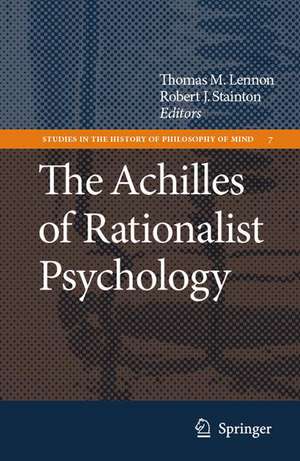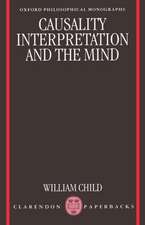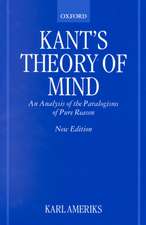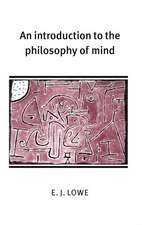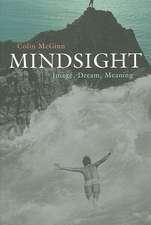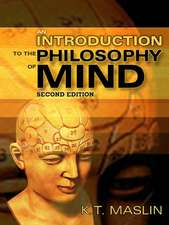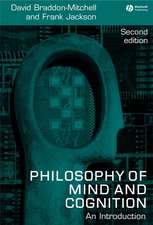The Achilles of Rationalist Psychology: Studies in the History of Philosophy of Mind, cartea 7
Editat de Thomas M. Lennon, Robert J. Staintonen Limba Engleză Hardback – 8 feb 2008
It is the aim of this volume to treat the major figures who have advanced the argument, or who have held views importantly bearing on it. Original essays by scholars with expertise on the relevant authors treat Plato, Aristotle, the Neoplatonists, the medievals, Descartes, Locke, Cudworth, Bayle, Clarke, Spinoza, Leibniz. Hume, Mendelsohn, Kant, Lotze, James, as well as those working in contemporary cognitive science on what is called the binding problem of how the human brain can unify the elements of experience into a single representation.
| Toate formatele și edițiile | Preț | Express |
|---|---|---|
| Paperback (1) | 640.55 lei 43-57 zile | |
| SPRINGER NETHERLANDS – 30 noi 2010 | 640.55 lei 43-57 zile | |
| Hardback (1) | 646.75 lei 43-57 zile | |
| SPRINGER NETHERLANDS – 8 feb 2008 | 646.75 lei 43-57 zile |
Din seria Studies in the History of Philosophy of Mind
- 20%
 Preț: 689.96 lei
Preț: 689.96 lei - 15%
 Preț: 649.54 lei
Preț: 649.54 lei -
 Preț: 387.75 lei
Preț: 387.75 lei - 24%
 Preț: 1051.82 lei
Preț: 1051.82 lei - 18%
 Preț: 1571.77 lei
Preț: 1571.77 lei - 18%
 Preț: 731.91 lei
Preț: 731.91 lei - 20%
 Preț: 572.09 lei
Preț: 572.09 lei - 15%
 Preț: 653.79 lei
Preț: 653.79 lei - 18%
 Preț: 733.33 lei
Preț: 733.33 lei - 15%
 Preț: 481.34 lei
Preț: 481.34 lei - 15%
 Preț: 647.92 lei
Preț: 647.92 lei - 15%
 Preț: 582.45 lei
Preț: 582.45 lei - 15%
 Preț: 643.16 lei
Preț: 643.16 lei - 18%
 Preț: 785.42 lei
Preț: 785.42 lei - 15%
 Preț: 651.34 lei
Preț: 651.34 lei - 18%
 Preț: 721.19 lei
Preț: 721.19 lei - 15%
 Preț: 635.80 lei
Preț: 635.80 lei -
 Preț: 448.58 lei
Preț: 448.58 lei - 15%
 Preț: 695.70 lei
Preț: 695.70 lei -
 Preț: 383.93 lei
Preț: 383.93 lei - 18%
 Preț: 727.66 lei
Preț: 727.66 lei - 18%
 Preț: 720.53 lei
Preț: 720.53 lei - 18%
 Preț: 952.89 lei
Preț: 952.89 lei - 15%
 Preț: 695.85 lei
Preț: 695.85 lei - 18%
 Preț: 1390.26 lei
Preț: 1390.26 lei - 18%
 Preț: 953.35 lei
Preț: 953.35 lei - 18%
 Preț: 944.99 lei
Preț: 944.99 lei
Preț: 646.75 lei
Preț vechi: 760.88 lei
-15% Nou
Puncte Express: 970
Preț estimativ în valută:
123.79€ • 134.51$ • 104.05£
123.79€ • 134.51$ • 104.05£
Carte tipărită la comandă
Livrare economică 21 aprilie-05 mai
Preluare comenzi: 021 569.72.76
Specificații
ISBN-13: 9781402068928
ISBN-10: 1402068921
Pagini: 300
Ilustrații: X, 290 p.
Dimensiuni: 155 x 235 x 18 mm
Greutate: 0.59 kg
Ediția:2008
Editura: SPRINGER NETHERLANDS
Colecția Springer
Seria Studies in the History of Philosophy of Mind
Locul publicării:Dordrecht, Netherlands
ISBN-10: 1402068921
Pagini: 300
Ilustrații: X, 290 p.
Dimensiuni: 155 x 235 x 18 mm
Greutate: 0.59 kg
Ediția:2008
Editura: SPRINGER NETHERLANDS
Colecția Springer
Seria Studies in the History of Philosophy of Mind
Locul publicării:Dordrecht, Netherlands
Public țintă
ResearchCuprins
Did Plato Articulate the Achilles Argument?.- Aristotle on the Unity of Consciousness.- The Neoplatonic Achilles.- The Unity of the Soul and Contrary Appetites in Medieval Philosophy.- Hume, Spinoza and the Achilles Inference.- Locke and the Achilles Argument.- The Reverse Achilles in Locke.- Cudworth and Bayle: An Odd Couple?.- The Achilles Argument and the Nature of Matter in the Clarke Collins Correspondence.- Leibniz’s ‘Achilles’.- Hume’s Reply to the Achilles Argument.- Kant and Mendelssohn on the Implications of the ‘I Think’.- Kant on the Achilles Argument.- William James and the Achilles Argument.- The Binding Problem: Achilles in the 21st Century.
Textul de pe ultima copertă
How is it that the mind perceives the words of a verse as a verse and not just as a string of words? One answer to this question is that to do so the mind itself must already be unified as a simple thing without parts (and perhaps must therefore be immortal). Kant called this argument the Achilles, perhaps because of its apparent invincibility, and perhaps also because it has a fatal weak spot, or perhaps because it is the champion argument of rationalism. The argument and the problem it addresses have a long history, from the ancient world right up to the present.
The Achilles of Rationalist Psychology consists of newly written papers addressing each of the main contributors to the discussion of the Achilles. Despite the historical importance and intrinsic interest of the argument, very little has been written about it. This volume should therefore be of use to advanced undergraduates, graduate students, and researchers across the domains of philosophy, history, and cognitive science.
The Achilles of Rationalist Psychology consists of newly written papers addressing each of the main contributors to the discussion of the Achilles. Despite the historical importance and intrinsic interest of the argument, very little has been written about it. This volume should therefore be of use to advanced undergraduates, graduate students, and researchers across the domains of philosophy, history, and cognitive science.
Caracteristici
Presents the only in-depth analysis of the argument as found throughout history Covers the main line in the history of the Achilles argument in the Western philosophical tradition Discusses variations on the Achilles argument and its criticism in ancient, medieval and early modern philosophy Makes a valuable and original contribution to the history of philosophy of mind Is relatively non-technical and therefore of use to students
